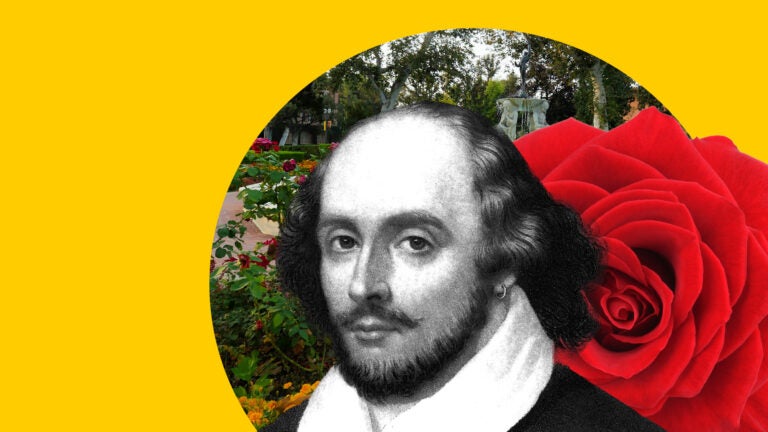
William Shakespeare’s claim to fame
At this moment, there is likely a William Shakespeare play on stage somewhere around the world. The World Shakespeare Bibliography estimates that more than 400 productions of his work were put on each year between 1959 and 2015.
The English playwright is one of the most popular dramatists of all time, but he remains a fairly enigmatic figure. “The verifiable facts of Shakespeare’s life can be written on a postcard and still leave room for an address and a postage stamp,” says Andrew Stott, professor of English at the USC Dornsife College of Letters, Arts and Sciences and USC’s vice provost for academic programs and dean of the graduate school.
Stott and scholars from USC Dornsife sat down for a Dornsife Dialogue to shed light on Shakespeare’s life, work and the reasons for his enduring legacy.
Who was William Shakespeare?
Information about Shakespeare’s personal life is limited. We know definitively that he was baptized, married and owned properties in London and Stratford-upon-Avon, but little else can be verified (including his date of birth.)
This scarcity of records has helped fuel theories that his plays were actually written by a different person, such as his contemporary and fellow playwright Christopher Marlowe, the philosopher Francis Bacon or courtier Edward de Vere. It’s an idea that has inspired films and heated discussions, even if most scholars don’t find these arguments credible.
Bruce Smith, Professor of English Emeritus, reminds the curious that images of all the legal papers signed by Shakespeare, and all of the documents of his era that mention him, can be viewed online at the Folger Shakespeare Library.
For Ian Smith, professor of English, the identity of Shakespeare shouldn’t necessarily be the main focus. “I don’t care that much about that question because, for me, the texts are what matters,” he says.
What would seeing a Shakespeare play during his time have been like?
The Globe Theatre in London, where many of his plays were first produced, opened to the sky. This would have given productions a sound dynamic similar to that of modern sports stadiums. The actors were all men and young boys, a theatrical tradition dating back to Ancient Greece. Bookkeeping records from sister companies that staged at The Globe indicate that costumes were likely made with lavish materials, some even donated by nobility.
“I imagine a very intense sound experience, but also a very intense visual experience in which the dominant colors of the costumes were red, white and black with gold trim,” says Bruce Smith, who authored Phenomenal Shakespeare (Wiley-Blackwell, 2010), which looks at how viewers experienced Shakespeare’s plays physically, not just in the mind.
Find a transcript of this audio here under the transcript tab.
Why are Shakespeare plays so popular?
Shakespeare touched on a broad range of universal themes, from love and romance to betrayal and revenge. This made his works pliable enough to be molded into all sorts of unique settings, like feudal Japan or prison, keeping them eternally fresh for audiences.
He also lived in a time of heightened global movement, in which England was increasingly encountering new cultures from distant lands. It bares similarity to our present-day experiences of globalization and escalating immigration. This has made plays like Othello and Titus Andronicus popular dramatic frameworks in which acting companies can examine identity, cultural collisions and race.
“Those plays continue to be relevant for us in ways that are not just thematic, as people might often say, but important for us because they speak to the crucial and urgent moment of our lives today,” says Ian Smith, whose book Black Shakespeare (Cambridge University Press, 2022) analyzes the racial dynamics of Shakespeare’s texts and legacy.
What first got our scholars interested in Shakespeare?
“It was actually reading Julius Caesar as a senior at Central High School in Jackson, Miss. It was a speech by Portia, in which she’s in a garden and has a monologue that very beautifully evokes the night. So, it was actually Shakespeare’s language that initially drew me in,” says Bruce Smith.
“The play that first excited me would have been King Lear, which I believe I read in high school,” says Ian Smith. “I just found it very powerful and moving, so much so that for many years I would not teach the play because I thought it was just so powerful and in, some ways, so personal.”